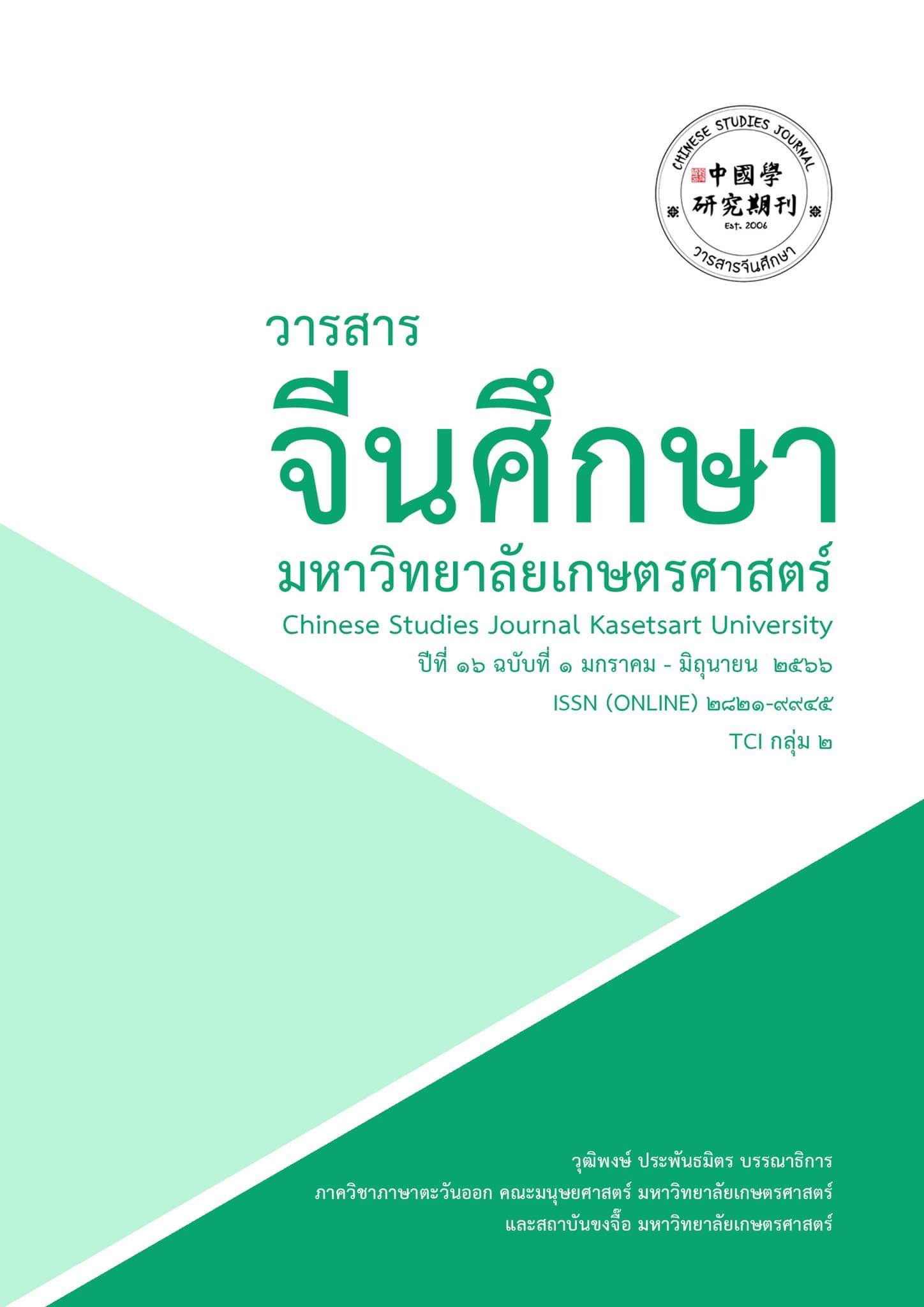A Comparison of Social Values Between China and Thailand Using “COVID-19” and Its Related New Words การศึกษาเปรียบเทียบคำศัพท์ใหม่ที่เกี่ยวข้องกับสถานการณ์ “โควิด-19” ตามมุมมองของค่านิยมระหว่างสังคมจีนและไทย
Main Article Content
Abstract
This study aims to compare social values between China and Thailand during the COVID-19 pandemic. It is based on the theory of linguistic memes, which considers situations for triggering, channels for diffusion, methods for diffusion, and circumstances for formation. The method used in our study is to compare the top six recently created Chinese words related to "COVID-19" from "Hanyu Pandian," which is held by The Commercial Press and the National Language Resources Monitoring and Research Center, and the top six recently created Thai words related to "COVID-19" from Google Trends Thailand. According to our research, battling the pandemic is a concern for both the Chinese government and the populace. The new Chinese words therefore refer to aiding the pandemic-affected areas. The values of collectivism were reflected in it. The economy is a bigger concern for the Thai government and people than the pandemic is. The majority of the popularly searched words relate to government relief measures. These actions can provide alleviation for the populace and stimulate consumption in line with the social values of prioritizing happiness and consuming with enjoyment. Individual-centered ideals are reflected in consistency.
Article Details

This work is licensed under a Creative Commons Attribution-NonCommercial-NoDerivatives 4.0 International License.
ผลงานทางวิชาการที่ลงตีพิมพ์ในวารสารจีนศึกษา มหาวิทยาลัยเกษตรศาสตร์ เป็นลิขสิทธิ์ของผู้เขียนหรือผู้แปลผลงานนั้น หากนำลงในวารสารจีนศึกษาเป็นครั้งแรก เจ้าของผลงานสามารถนำไปตีพิมพ์ซ้ำในวารสารหรือหนังสืออื่นได้โดยมิต้องแจ้งให้ทราบล่วงหน้า แต่หากผลงานที่ได้รับพิจารณานำลงในวารสารจีนศึกษา เป็นผลงานที่เคยตีพิมพ์ที่อื่นมาก่อนเจ้าของผลงานต้องจัดการเรื่องปัญหาลิขสิทธิ์กับแหล่งพิมพ์แรกเอง หากเกิดปัญหาทางกฎหมาย ถือว่าไม่อยู่ในความรับผิดชอบของวารสารจีนศึกษา มหาวิทยาลัยเกษตรศาสตร์ ทั้งนี้ ความคิดเห็นต่างๆ ในบทความเป็นความคิดเห็นส่วนตัวของผู้เขียน ไม่เกี่ยวกับกองบรรณาธิการวารสารจีนศึกษา มหาวิทยาลัยเกษตรศาสตร์
References
Chan-o-cha, P. (2014). TV program from General Prayuth Chan-o-cha titled "Returning Happiness to Thailand". Ministry of Justice. https://www.moj.go.th/attachments/20170315124039_58697.pdf/[2022, August 13]
Chen, L. (2015). The Core Values of Chinese Civilization. Beijing: SDX Joint Publishing Company.
Chiewchan, S. (2021). Language Usage in the News of the COVID-19 Pandemic from Online Newspapers. Faculty of Humanities and Social Sciences, Nakhon Sawan Rajabhat University Academic Journal 8(1), 72-89.
Dechawongse, S., Nyanaviro, P. W., & Mahaviro, P. S. (2021). COVID-19: CHANGE IN THE THAI LANGUAGE. Journal of Educational Review Faculty of Educational in MCU 8(2), 410-420.
Fu, M., & Pan, J. (2021). Jiyu xinguafeiyan yiqing de wangluo yuyan yuqing yanjiu. Pinwei • Jingdian 2021(12), 80-86.
Google Trends. (2020). Year in search 2020 Thailand. Google Trends.
https://trends.google.co.th/trends/yis/2020/TH/[2022, August 15]
Google Trends. (2021). Year in search 2021 Thailand. Google Trends. https://trends.google.co.th/trends/yis/2021/TH/[2022, August 15]
He, Z., & Chen, X. (2014). Linguistic memes theory and application. Guangzhou: Jinan University Press.
Hu, J. (2012). FIRMLY MARCH ON THE PATH OF SOCIALISM WITH CHINESE CHARACTERISTICS AND STRIVE TO COMPLETE THE BUILDING OF A MODERATELY PROSPEROUS SOCIETY IN ALL RESPECTS--Report to the Eighteenth
National Congress of the Communist Party of China on Nov 8, 2012. The state Council the People’s Republic of China. http://www.gov.cn/ldhd/2012-11/17/content_2268826.htm/[2022, August 12]
Khunghongjan, S. (2016). Relationships between Globalization and Basic Values of Thai Society. Humanity and Social Science Journal, Ubon Ratchathani University 7(1), 160-185.
Kittitharo, T. (2014). Changing Values in Present Society. Journal of MCU Social Science Review 3(3), 25–37.
Li, J. (1996). Xinci xinyu yanjiu yu cishu bianzuan. Lexicographical Studies 1996(3), 30-38.
Lu, J. (2021). Xinguan yiqing cuisheng dabo xinyu reci. The World of English 2021(03), 104-108.
Luo, W., & Wang, J. (2022). Analysis of neologisms and new meanings in context of combating COVID-19. Journal of Zhejiang University of Science and Technology 34(2), 155-162.
Ministry of Education. (2020). Buzzword of 2020. Ministry of Education of the people’s Republic of China. http://www.moe.gov.cn/jyb_xwfb/gzdt_gzdt/s5987/202012/t20201222_506997.html/ [2022, August 12]
Ministry of Education. (2021). Buzzword of 2021. Ministry of Education of the people’s Republic of China. http://www.moe.gov.cn/jyb_xwfb/gzdt_gzdt/s5987/202112/t20211220_588659.html/ [2022, August 12]
Onlamoon, N., Boonkhan, B., & Sengchuen, N. (2022). English Synonyms in COVID-19 Related News from the Bangkok Post and The Nation Online Newspapers. Aksara Pibul Journal 3(1), 104-114.
Phrakhrusakornsuthidham, Inpech, I., & Intongpan, P., (2019). Buddhist Ways to Promote Thai Social Values. Journal of MCU Peace Studies 7(6), 1652-1661.
Sereechaikul, T. (2021). Features of Language and Contents in COVID-19 Hashtags on Twitter. Mekong-Salween Civilization Studies Journal 12(2), 40-60.
The World Bank. (2021). Thailand Overview. World Bank Open Data. https://data.worldbank.org/country/thailand?view=chart/[2022, September 13]
Wang, H. & Lin, G. (2021). Study Ecological Teaching on the Hot Words of COVID-19 in Teaching Chinese as a Foreign Language. Journal of Mudanjing University 2021(1), 75-79.
Wang, J., & Hu, X. (2020). Kangji yiqing yujing xia de wangluo yuyan chuanbo. Journal of Fujian Provincial Committee Party School of CPC (Fujian Academy of Governance) 2020(3), 153-158.
Yi, C. (2013). Taiguo Guojia Gaikuang. Chongqing: Publishing House of Chongqing University.


